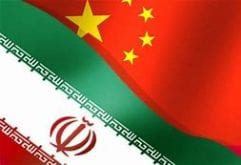VOA – Turkish President Recep Tayyip Erdogan on Friday continued to chart a collision course with Washington over Iran. Erdogan is categorically ruling out enforcing American sanctions intended to put Iran in an economic straitjacket.
“It is impossible for us to cancel relations with Iran with regard to oil and natural gas. We will continue to buy our natural gas from there,” Erdogan said to reporters Friday, while returning from the United Nations General Assembly. Turkey is Iran’s second-largest importer of natural gas.
“The importance [of] this announcement is economic,” said Iran expert Jamshid Assadi of France’s Burgundy Business School. “Any income in Tehran’s situation is very welcome by the regime, which is increasingly starved of funds.”

President Donald Trump imposed sweeping sanctions on Tehran after withdrawing the United States from an international nuclear accord with Iran. Dubbed a “maximum pressure campaign” by Trump, White House officials indicated they want to cut Iran’s energy exports to zero.
“The American grand strategy in the region, is not on the same line as Turkey’s foreign policy, not now and not in the past,” said international relations professor Huseyin Bagci of Ankara’s Middle East Technical University. “Turkey will not go against Iran; we will not be Iran’s enemy. Competitor yes, but never its enemy.”
Erdogan acknowledged U.S. sanctions are impacting trade with Iran, saying Turkish private companies have curtailed oil purchases from the Islamic nation to avoid punitive measures. Speaking anonymously, a European banker said internationally-operating Turkish companies would not risk being hit with U.S. sanctions for trading with Iran.
Even so, the Turkish president is pledging to step up bilateral trade. “On this issue [trade] especially and many other issues, we will continue our relations with Iran,” said Erdogan.

Last week, Erdogan reportedly discussed with Iranian President Hasan Rouhani a goal of tripling bilateral trade, which currently stands at $10 billion. The discussions focused on ways to use domestic currencies — the Turkish lira and Iranian rial — as a means of evading U.S. sanctions that prohibit the use of the dollar in trade transactions with Iran.
“Turkey will circumvent and break U.S. sanctions against Iran, just as they have done in the past,” said Bagci, “because Ankara does not believe it’s bound by those sanctions. This will likely result in U.S. sanctions against Turkey, but Turkey is ready for that.”
Erdogan told Fox News on Wednesday, “Sanctions have been avoided in the past. I, for one, know that sanctions have never solved anything.”
Last year, a New York Court convicted and jailed a senior banking executive of the Turkish state-owned Halkbank for violating U.S. sanctions on Iran.

U.S. authorities are still considering whether to impose a fine against Halkbank, which analysts say could run into the billions of dollars. The size of any potential penalty is widely seen as leverage Washington has over Ankara.
Undaunted, Erdogan told reporters Friday he was aware his stance could invite punitive measures from Washington. Analysts note the Turkish president had already irked Washington by casting doubt over claims Tehran was responsible for an attack earlier this month on Saudi Arabia oil refining facilities.
“If we just place the entire burden on Iran, it won’t be the right way to go. Because the evidence available does not necessarily point to that fact,” Erdogan said Wednesday.

Several key European countries are backing Washington’s belief that Tehran is behind the attack.
Ankara’s strong backing of Tehran comes as Erdogan is trying to build regional support for his plan to repatriate as many as two million Syrian refugees.
Erdogan envisages relocating the refugees to a so-called “safe zone” in northeast Syria currently controlled by the YPG, a Syrian Kurdish militia. Ankara designates the YPG as terrorists, and Turkish forces are poised to push the militia 40 kilometers back from Turkey’s frontier.

Speaking in Ankara earlier this month, Rouhani insisted refugees be returned to their home towns, not repatriated en masse.
“Rouhani is saying to Turkey, that it will not support Ankara’s plan of the mass returning of refugees, “said international relations lecturer Soli Ozel of Istanbul’s Kadir Has University.
“Damascus and Tehran are perfectly happy that millions of Sunni Arabs, which oppose Damascus, are out of Syria,” he added.
Analysts suggest Tehran will not soften its stance.
“Tehran will not just change its stance over Syria and refugees because Ankara is opposing U.S. sanctions, that is just a dream,” said Bagci.
Despite Ankara and Tehran backing opposing sides in the Syrian civil war, the two countries, along with Moscow, say they want an end to the conflict.
Ankara’s cooperation with Moscow on Syria has alarmed Washington. Turkey’s purchase of Russia’s S-400 missile system prompted Washington to suspend sales of the U.S. F-35 fighter jets. Turkish companies were also excluded from the warplane’s construction.
 Shabtabnews In this dark night, I have lost my way – Arise from a corner, oh you the star of guidance.
Shabtabnews In this dark night, I have lost my way – Arise from a corner, oh you the star of guidance.


